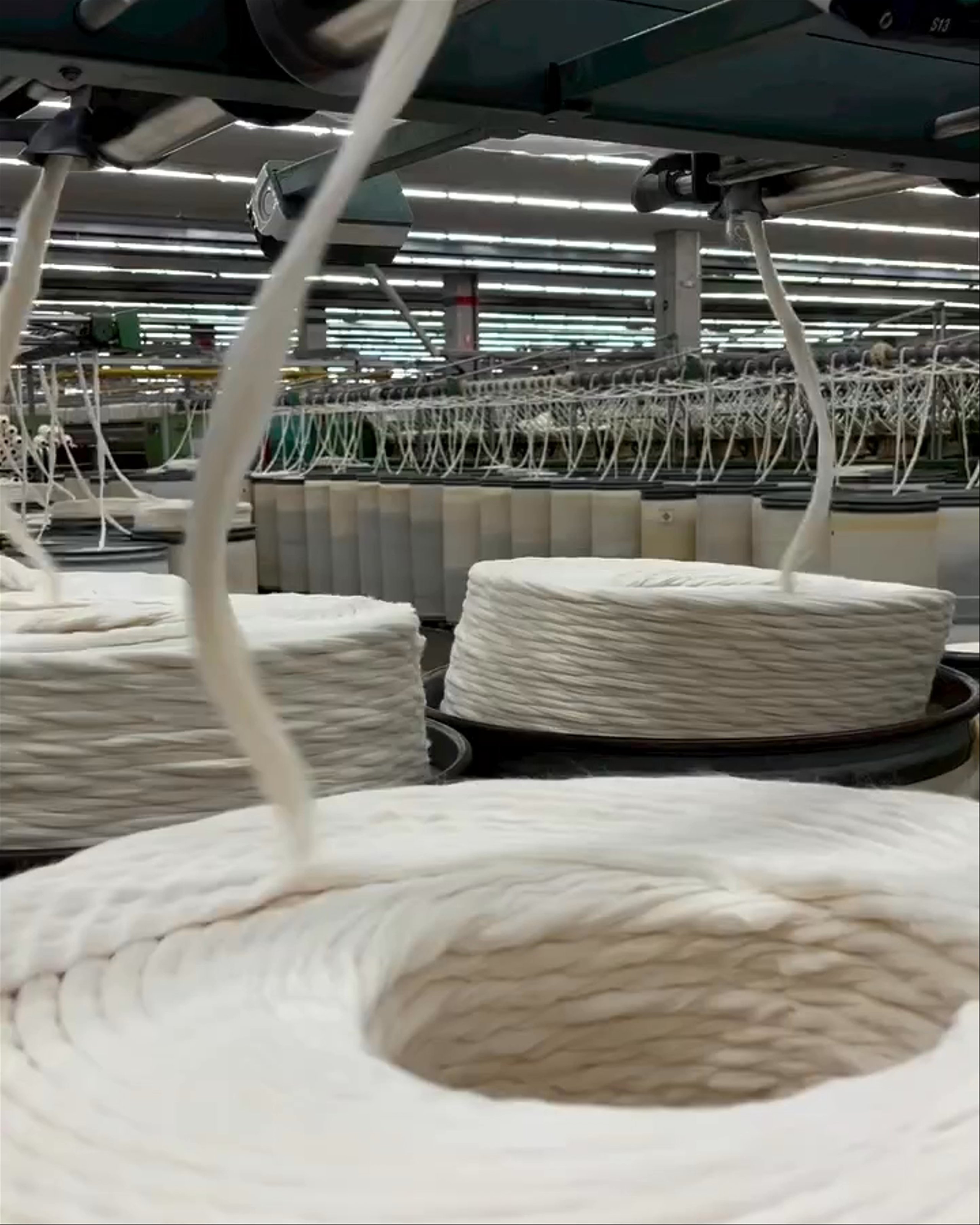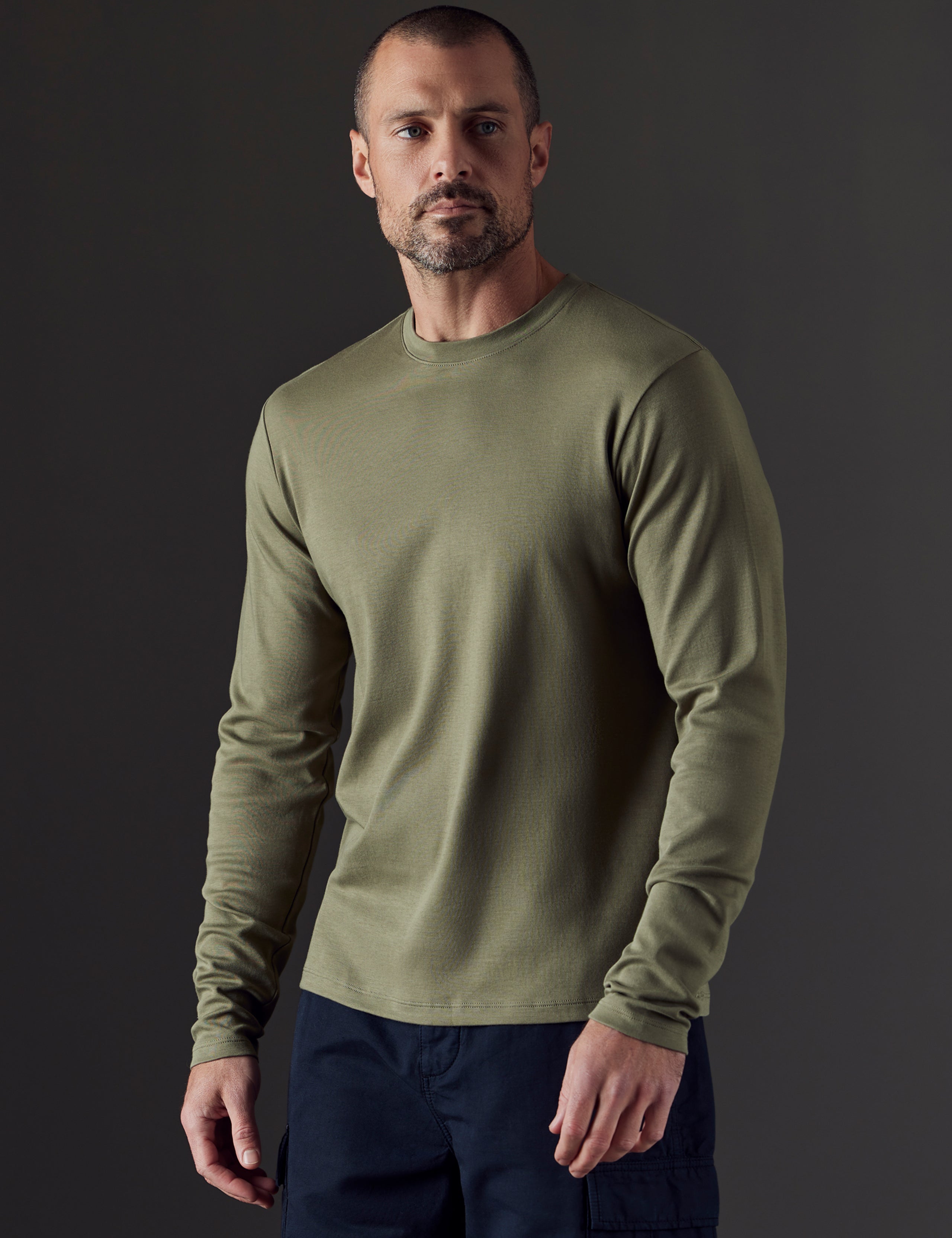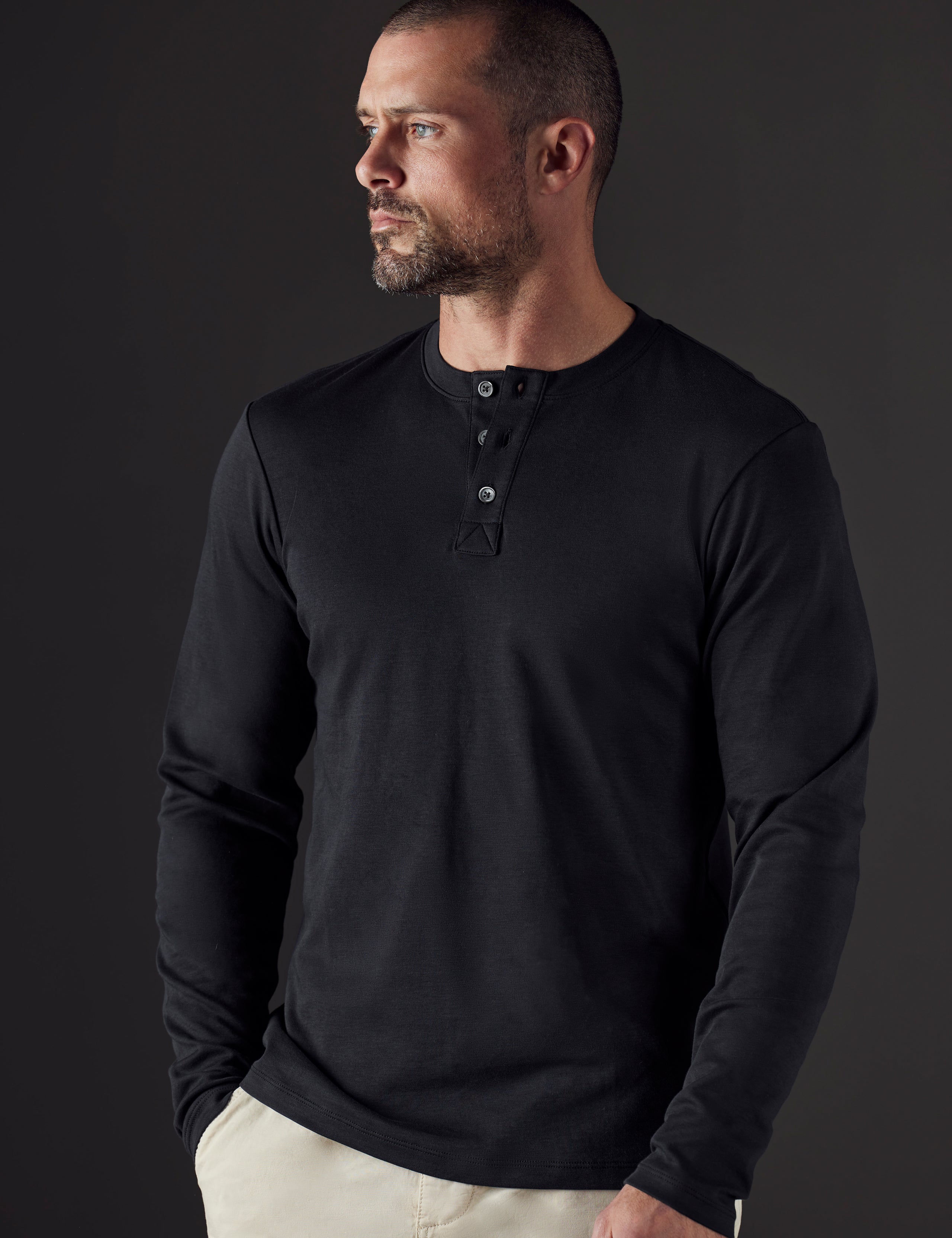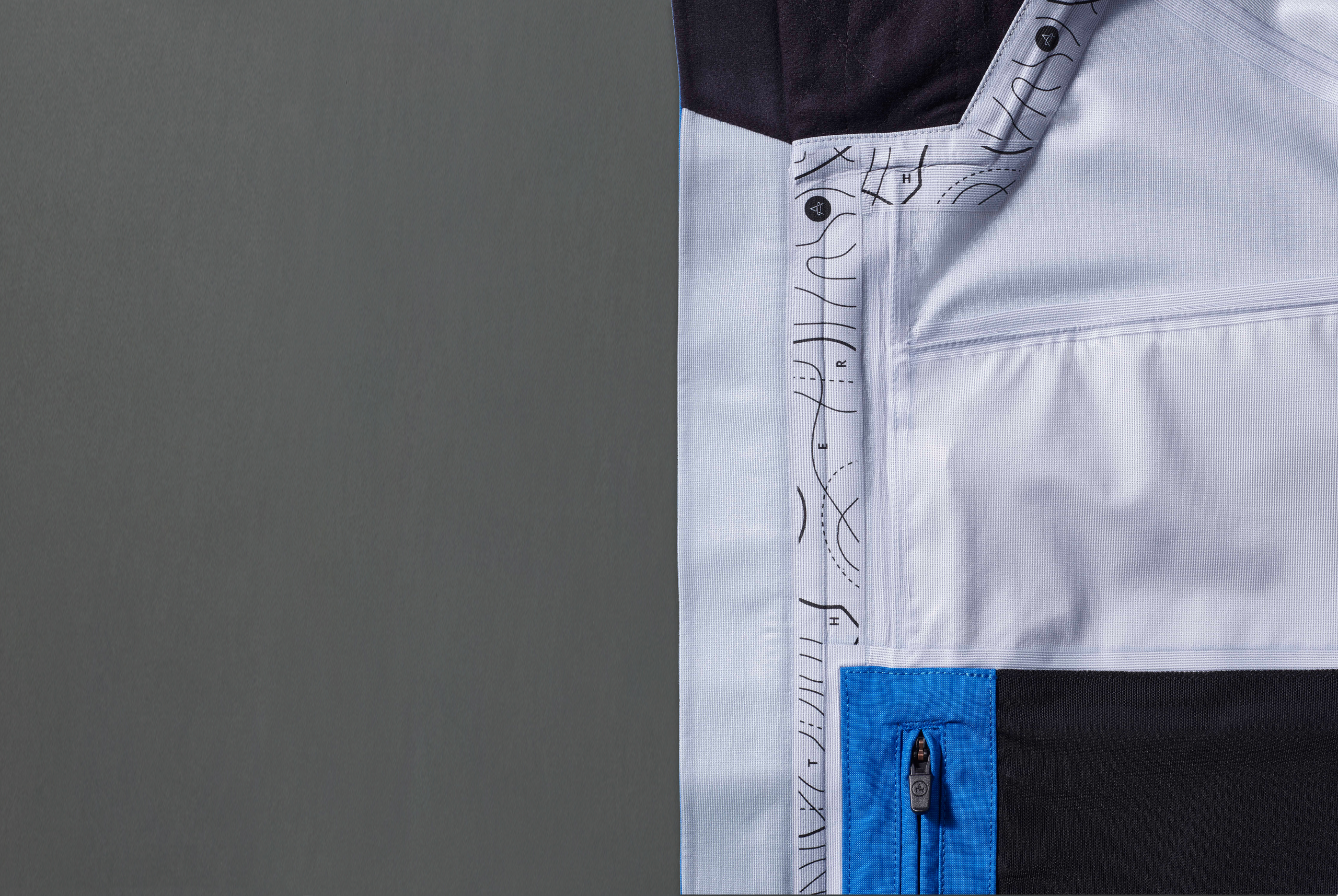
AETHER x Bergman/Rivera: Pima, The Ultimate Cotton
The use of premium materials has been a cornerstone for AETHER since its inception in 2009. And while this hallmark trait most often takes the form of state-of-the-art membranes and shells on our technical outerwear, AETHER’s basics and essentials also utilize some of the finest fabrics and constructions available. Case in point: AETHER’s use of Bergman/Rivera’s Pima Cotton. In this post, we’ll be taking a deep dive into Pima, exploring what makes it so special, and why this material has become AETHER’s go-to choice for crafting fine cotton shirts and other wardrobe basics.
The Company Behind The Cotton
Founded in 1986, Bergman/Rivera is a Swedish-Peruvian, family-owned and operated company that produces organic cotton textiles. Based in Lima, Peru, B/R has been a major pioneer in creating ethical, sustainable Pima cotton production. Working with over 160 independent family farms, the company strives to create better conditions for cotton farmers, and to deliver fair, livable wages. The first company in Latin America to be certified under the Global Organic Textile Standard from the field to the finished garment, B/R boasts certifications from no-less-than half-a-dozen different independent organizations and regulatory bodies. It’s not just B/R’s ethics, transparency, or sustainability that makes it so special, as the Pima Cotton that it produces is unequivocally some of the finest on the planet.


What exactly is Pima cotton?
Before diving into the properties that make it so noteworthy, it’s crucial to have at least a tenuous grasp on exactly what Pima Cotton is. Incredibly rare, comprising just 3% of all cotton grown, Pima consists of a type of cotton that’s primarily characterized by its extra-long fibers — a variety known as “Extra-Long Staple” (or “ELS”) cotton. Thanks to the markedly longer fibers, each thread produced is not only smoother and finer, but also much stronger. Consequently, these higher-quality threads give way to higher-quality fabric.


What Makes Pima Cotton So Special?
There’s a slew of factors that separate Pima Cotton from your average run-of-the-mill cotton construction — so much so, in fact, that it’s hard to even know where to begin. Having said that, we’ll start with the characteristic that initially drew AETHER to Bergman/Rivera’s Pima.
Ultra Soft-To-The-Touch
Thanks to the aforementioned extra-long staple fibers, Pima Cotton boasts unmistakably fine and smooth threads that are insanely soft-to-the-touch. This ultimately makes for a construction that feels incredible on-skin.
Sustainability
Made using water from the Andes mountains, B/R’s Pima Cotton is certified by six different agencies: Global Organic Textile Standard-certified; USDA Organic-certified; European Union Organic-certified; Fair Trade-certified; B Corp-certified; and Regenerative Organic-certified. Because of B/R’s unparalleled transparency and the lengths the company has gone to in order to ensure that its textiles are environmentally friendly, it truly does deliver some of the finest and most sustainably-produced cotton in the world — Pima or otherwise.

From seed to harvest takes about 8 months
Entirely Organic
While it may come as a surprise to some, ordinary cotton is one of the most polluting crops on the planet, being responsible for 6% of all pesticides used and a whopping 16% of all insecticides. Completely natural, completely organic, and completely renewable, B/R’s Pima Cotton is as soft on your skin as it is on the planet. The way it’s grown also has the benefit of not exposing famers to dangerous and toxic chemicals like pesticides and insecticides.
Strength
B/R’s Pima Cotton isn’t only sustainably made and super soft-to-the-touch, but it’s also markedly stronger than its shorter-staple counterparts, which are around half-as-long. The longer staples are stronger and result in yarn with at least 30% greater tensile strength. This makes garments crafted from Pima Cotton substantially more durable. What’s more, Pima also benefits from being less prone to tearing, pilling, or fraying. This all adds up to garments that last considerably longer than regular cotton clothing. In fact, Pima garments can last up to five-times as long — at least if properly cared for.
Looks Newer Longer
On top of being less likely to shrink, apparel made from Pima Cotton also does a much better job of retaining dyes and color, plus is less susceptible to seeing its color fade over time. This ultimately makes for clothing that looks more vibrant — even after going through the wash several dozen times.


Breathability & Wearability
As if being way softer and stronger wasn’t enough, B/R’s Pima Cotton is quite a bit more comfortable than shorter-staple cotton in another pivotal way, and that’s in its superior breathability. Thanks to stellar temperature-regulating properties, Pima Cotton does a phenomenal job of keeping its wearer cool and comfortable. This ultimately results in markedly more comfortable garments that afford better overall wearability.
Better Value
Because of the techniques used to farm, harvest, and process Pima Cotton, the higher wages paid to the farmers that grow it, and the many certifications it’s received, B/R’s Pima Cotton does come at a noticeably higher price than apparel made from ordinary cotton. Having said that, Pima Cotton clothing actually delivers better bang-for-your-buck in the long run, as these garments last much, much longer.
Guilt-Free Garments
When buying AETHER’s Pima Cotton styles, you’re not only getting a better, longer-lasting product that offers superior value, but also ones that are much more environmentally friendly and wildly more sustainable. Just as important, these pieces of clothing help to support local communities of farmers and help ensure these families receive fair, livable compensation for their crop.


Bergman’s Certifications
Bergman/Rivera’s textiles have all been awarded with half-a-dozen different independent certifications.


Global Organic Textile Standard
The GOTS Certification process includes all the stages that involve the transformation of raw materials starting from production, packaging, labeling, export, import and distribution. This standard is the most demanding and updated on the latest sustainable textile trends in environmental practices and fair trade, and controls the use of eco-friendly inputs that do not jeopardize the workers and final consumer.
USDA Organic
The Department of agriculture of the United States of America- National Organic Program develops implements and administrates the national production standards, handling and labeling of Organic agricultural products. NOP standard also confirms the certifier bodies that are in charge of conducting audits of productions and operations that comply with this standard. The Department of Agriculture of the United States certifies that Bergman/Rivera’s organic Cotton fulfills the USDA standard requirements, persevering biodiversity, not using genetically modified seeds, synthetic pesticides or chemical fertilizers.
European Union Organic
The European Union bases its organic agriculture program in the Regulation EC 834/2007 that regulates the production, management and labeling of the organic products through the European Union.
Fair Trade Certified
Fair Trade Enterprises prioritize people and the planet. This means they pioneer solutions to important issues like overuse of natural resources, women’s empowerment, human rights, inequality and sustainable farming. Fair Trade certified organizations support organic agriculture, generate new models of social enterprise and create new ways to champion the dignity of workers, farmers, artisans and communities around the world.


Certified B Corporation
Certified B Corporations are businesses that meet the highest standards of verified social and environmental performance, public transparency, and legal accountability. The B Corp community works toward reduced inequality, lower levels of poverty, a healthier environment, stronger communities, and the creation of more high-quality jobs with dignity and purpose.
Regenerative Organic Certified
Regenerative Agriculture describes farming and grazing practices, that among other benefits reverse climate change. These practices help to rebuild organic soil matter and to restore its biodiversity. By Implementing this method results in the land being able to retain carbon dioxide emissions and water. It is based in 3 fundamental principles: Soil Health; Animal Welfare; and Fair Trade. Bergman/Rivera is the 3rd organic cotton producer in the world to have obtained this certification.



























